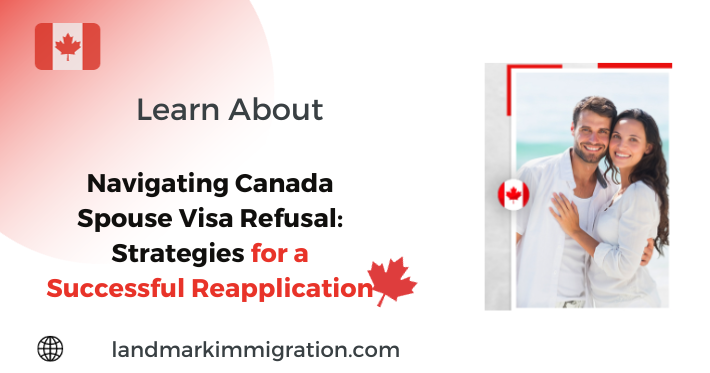Navigating Canada Spouse Visa Refusal: Strategies for a Successful Reapplication
The process of obtaining a Canada Spouse Visa can be complex and daunting. Unfortunately, visa refusals can occur, creating setbacks and uncertainties for couples aiming to reunite or start a life together in Canada. Receiving a refusal notice can be disheartening, but it's important to understand that it's not the end of the road. With proper understanding, preparation, and strategic planning, it's possible to address the issues that led to the refusal and reapply successfully.
Understanding the Refusal Reasons:
The initial step after facing a refusal is to thoroughly understand the reasons behind it. Immigration authorities provide a detailed explanation in the refusal letter outlining the grounds for denial. Common reasons include insufficient documentation, financial discrepancies, concerns about the genuineness of the relationship, or inability to meet eligibility criteria.
Seek Professional Assistance:
Engaging an immigration lawyer or consultant experienced in spouse visa applications can be immensely beneficial. These professionals can analyze the refusal letter, assess your case, and provide guidance on addressing the concerns raised. They offer invaluable expertise in navigating complex immigration procedures and can significantly increase the chances of a successful reapplication.
Review and Reassess:
After understanding the reasons for refusal, it's essential to meticulously review the application and identify areas that need improvement. This includes ensuring all required documents are provided, addressing any financial or sponsorship concerns, and providing additional evidence to strengthen the genuineness of the relationship.
Addressing Genuineness Concerns:
Proving the authenticity of your relationship is crucial.
The Canadian Government maintains strict scrutiny over
visa applications, particularly in cases of spousal visas, due to a rise in fraudulent submissions aiming to obtain PR status unlawfully. This surge in fraudulent attempts has heightened the challenges of crafting a robust submission that can secure approval without complications.
IRCC meticulously examines the authenticity of each relationship to prevent fraudulent marriages for immigration purposes. In cases where the genuineness of the marriage is in doubt, the submission faces rejection, and the applicant seeking sponsorship may face a 5-year ban from entering Canada for Misrepresentation.
- It is advisable to consider appealing a denial for Spousal Sponsorship only if the initial submission was thoroughly prepared.
- Include all required information and documents. Many rejections stem from incomplete or inadequately supported submissions.
- In such cases, reapplying is often the recommended course of action rather than appealing the decision.
The processing time for resubmitting a Canada Spouse Visa application is generally much quicker, ranging from 6 to 12 months, compared to the lengthy duration of more than 12 months for an appeal.
- Providing evidence such as photographs, communication records, joint financial commitments, and testimonials from family and friends can help demonstrate the genuine nature of your relationship.
- Any inconsistencies noted in the initial application should be clarified and supported with additional evidence in the reapplication.
Financial and Sponsorship Requirements:
One of the common reasons for refusal involves financial insufficiency or discrepancies in meeting the sponsorship requirements. Ensuring all financial documents, such as bank statements, tax records, and employment details, are accurate, up-to-date, and meet the specified thresholds is essential.
Submitting a Stronger Reapplication:
The key to a successful reapplication lies in addressing the concerns raised in the refusal letter comprehensively. Providing clear and concise documentation, organizing information systematically, and ensuring accuracy and completeness in the application are paramount.
Conclusion:
Receiving a refusal for a
Canada Spouse Visa can be disheartening, but it's essential to view it as an opportunity to rectify any shortcomings and reapply more effectively. Understanding the reasons behind the refusal, seeking professional guidance, and addressing concerns with thorough documentation and evidence can significantly enhance the chances of a successful reapplication.
It's crucial to approach the reapplication process with patience, attention to detail, and a proactive mindset. While the journey might seem challenging, perseverance and strategic planning can ultimately lead to a successful outcome, reuniting loved ones in Canada.

